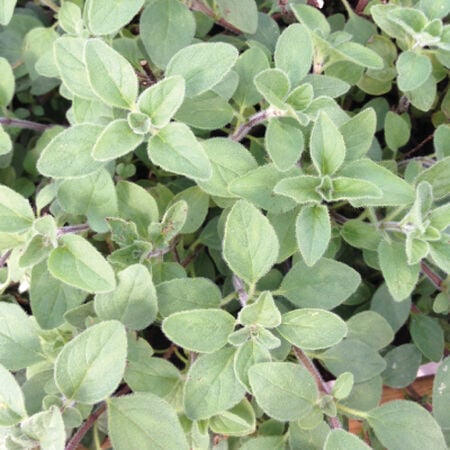Greek, Oregano Seed
Key Attributes
Key Attributes
Product Details
Weight
0.008Depth
0.1Height
4.5Width
3.25Plant Height
24-30"Botanical Name
Origanum vulgare hirtumSeed Type
SeedSeeds Per Gram
9,869Seeds Per Pound
4,475,000Packet
100 SeedsSow Depth
Top of SoilSeeds Per Ounce
279,688Breed
Open-pollinatedSun
Full SunGrowing Conditions
Container FriendlyLife Cycle
PerennialSow Method
TransplantCategories
HerbGermination
11,12,13,14,7,8,9,10Days To Maturity (# Days)
90Components
Growing Instructions
![]() Learning Download: How to Grow Oregano
Learning Download: How to Grow Oregano
Oregano has a very strong flavor, so only a little should be used at a time. Oregano is a member of the mint family and comes in many different varieties that have slightly different flavors. Like most herbs, oregano can be grown indoors or out in the garden. Oregano is a native to hot and dry regions, which makes the herb grow in places where drought is eminent.
Before Planting: Plant seeds indoor before the last frost date, as early as February. Similar to marjoram, oregano seeds are dust-like and fragile.
Planting: Do not bury them in soil but distribute them evenly across the top of the soil and mist with water. Cover the seed tray with a plastic dome and place in a sunny window. Once the dangers of frost have passed,
transplant seedlings to the garden. Thin seedlings to 12 inches apart when they reach 6 inches in height. When transplanting, plant the seedlings in a sunny, well-drained area.
Watering: Only water oregano during long dry periods.
Fertilizer: Oregano is a very hardy plant that doesn’t require fertilization. If you choose to fertilize the plant, do so lightly as not to damage it. However, oregano can grow in poor, dry conditions and doesn’t need fertilizer to produce its flavorful leaves.
Days to Maturity: Once oregano reaches 4 to 6 inches tall, it is ready to harvest. (See each variety for days to harvest)
Harvesting: Harvest by pinching off individual leaves or clipping an entire branch. The leaves can be dried or frozen but store them away from direct light.
Tips: Once plants flower, cut them back to prevent them from growing leggy. After its growing season, cut oregano down to the ground and cover with mulch. If oregano is growing in a container, bring the container indoors to continue growth throughout the winter.
Shipping Schedule
Our Seed Promise
 "Agriculture and seeds" provide the basis upon which our lives depend. We must protect this foundation as a safe and genetically stable source for future generations. For the benefit of all farmers, gardeners and consumers who want an alternative, we pledge that we do not knowingly buy or sell genetically engineered seeds or plants.
"Agriculture and seeds" provide the basis upon which our lives depend. We must protect this foundation as a safe and genetically stable source for future generations. For the benefit of all farmers, gardeners and consumers who want an alternative, we pledge that we do not knowingly buy or sell genetically engineered seeds or plants.
The mechanical transfer of genetic material outside of natural reproductive methods and between genera, families or kingdoms, poses great biological risks as well as economic, political, and cultural threats. We feel that genetically engineered varieties have been insufficiently tested prior to public release. More research and testing is necessary to further assess the potential risks of genetically engineered seeds. Further, we wish to support agricultural progress that leads to healthier soils, to genetically diverse agricultural ecosystems, and ultimately to healthy people and communities.
To learn more about the "Safe Seed Pledge" please visit www.councilforresponsiblegenetics.org.

